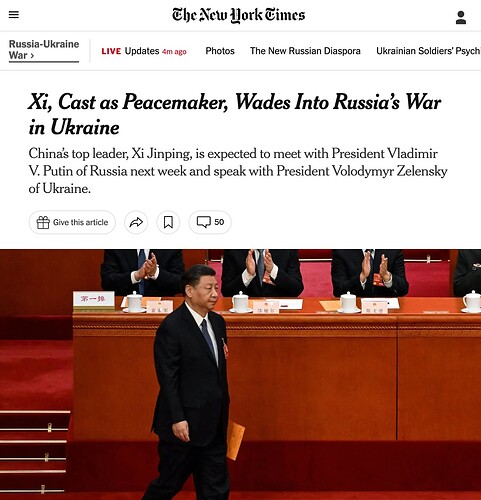-
中国国家主席习近平正试图将自己塑造成俄乌冲突的调解人,他可能会与乌克兰总统沃洛基米尔-泽伦斯基通话,并与俄罗斯总统弗拉基米尔-普京会面。中国已经提出了一个和平解决方案,尽管它没有涉及重要的细节,如俄罗斯可能撤军。
-
习近平正试图获得作为替代美国主导的世界秩序的领导人的合法性,以抵制华盛顿对中国的 “遏制、包围和压制”。
-
由于目标和利益的冲突,西方对习近平的战争意图存在怀疑,因为中国从未谴责过俄罗斯的入侵,而是附和克里姆林宫的说法,认为战争是由北约扩张挑起的。
-
俄罗斯和乌克兰都认为中国是一个潜在的变革力量,具有结束两国之间僵局的影响力。如果中国在补充莫斯科的军火库方面发挥更直接的作用,它也可以从根本上改变战场上的态势。中国的国际影响力被视为对和平至关重要,北京希望通过结束战争来修复与欧洲的关系。
-
为了防止欧洲与美国的关系过于紧密,中国国家主席习近平很可能需要表现出对结束战争的强烈努力。这可能有助于满足包括德国和法国在内的急于加强与北京经济交往的大国。对莫斯科来说,和平谈判的标准很高。俄罗斯已经拒绝了西方将撤军作为谈判条件的要求,并可能优先要求帮助补充军事级别的零部件库存。
-
对乌克兰来说,中国长期以来代表着一条潜在的生命线,乌克兰总统泽伦斯基数月来一直寻求与习近平举行会谈。中国一直试图将自己描绘成战争中的一个中立旁观者,但继续向俄罗斯提供外交和经济支持。
-
中国在2月份发布了一份立场文件,概述了政治解决战争的方案,该文件被西方领导人广泛批评为缺乏具体计划,并避免提出可能伤害北京与莫斯科关系的要求。
-
华盛顿上个月警告说,中国正准备向俄罗斯提供致命武器,并威胁说,如果中国采取后续行动,将实施制裁。
-
北京准备支持普京先生,但只是为了帮助他继续执政,并维护一个反对西方的统一战线。
-
这两个核武大国之间的深厚关系据说因习近平先生和普京先生之间的个人亲和力而得到加强。
-
在习近平先生为期三天的访问中,中国和俄罗斯将讨论两国 “进一步发展全面伙伴关系的问题”,以及 “深化俄中在国际舞台上的合作”。
-
在乌克兰问题上,中国始终站在和平、对话和历史正确性的一边。
-
习近平是否会在访问期间提出和平谈判的想法,并抓住沙特和伊朗之间交易的势头,还有待观察。
-
沙特和伊朗交易的双方已经举行了广泛的会谈,并表示愿意修补关系,而乌克兰和俄罗斯仍然被锁定在一场血腥的战争中,双方似乎都不准备通过谈判来结束战争。
-
中国在国际外交中发挥着更大的作用,这从它参与沙特-伊朗协议中可以看出。由于中国与这两个国家的关系密切,而且采取了不干涉主义的做法,因此北京能够成为该协议的中介。它帮助解决俄乌冲突的能力可能取决于基辅如何看待北京。
-
这场战争对中国有利,因为它提供了获得折扣石油的机会,并使美国不再关注亚洲。它还使中国国家主席习近平能够进一步完成其 "民族复兴 "的使命,因为它削弱了美国在该地区的影响力。
-
中国正在采取更积极的国际外交方式,并希望挑战美国的影响力。这在其参与沙特-伊朗协议和可能参与俄罗斯-乌克兰冲突中可以看出。中国希望在全球稳定中发挥更大的作用,成为一个可信的调解人。
-
Chinese president Xi Jinping is attempting to portray himself as a mediator in the Russia-Ukraine conflict, with a potential call with Ukrainian President Volodymyr Zelensky and a meeting with Russian president Vladimir Putin. China has proposed a peace settlement, though it does not address important details such as a potential Russian troop withdrawal.
-
Xi Jinping is trying to gain legitimacy as the leader of an alternative world order to one dominated by the United States, in order to resist Washington’s “containment, encirclement and suppression” of China.
-
Western skepticism of Xi Jinping’s intentions on the war exists due to conflicting goals and interests, as China has never condemned Russia’s invasion, and has instead echoed Kremlin assertions that the war was provoked by NATO expansion.
-
China is seen by both Russia and Ukraine as a potentially transformative power with the influence to end the impasse between them. China could also fundamentally alter the dynamics on the battlefield if it plays a more direct role in replenishing Moscow’s arsenal. China’s international influence is seen as essential for peace and Beijing hopes to repair its relationship with Europe through ending the war.
-
In order to prevent Europe from aligning too closely with the United States, Chinese President Xi Jinping will likely need to demonstrate a strong effort to end the war. This could help satisfy powers eager to ramp up economic engagement with Beijing, including Germany and France. For Moscow, the bar for peace talks is high. Russia has rejected Western demands to withdraw troops as a condition for talks and will likely prioritize asking for help replenishing stocks of military-grade components.
-
For Ukraine, China has long represented a potential lifeline and its President Zelensky has sought to hold talks with Xi Jinping for months. China has sought to portray itself as a neutral bystander in the war but has continued to provide diplomatic and economic support to Russia.
-
China released a position paper in February outlining a political settlement to the war, which was widely criticized by Western leaders for lacking concrete plans and avoiding demands that could hurt Beijing’s ties with Moscow.
-
Washington warned last month that China was preparing to provide lethal weapons to Russia and threatened to impose sanctions if it follows through.
-
Beijing is prepared to back Mr. Putin, but only enough to help him remain in power and preserve a united front against the West.
-
The deep ties between the two nuclear-armed powers are said to be enhanced by a personal affinity between Mr. Xi and Mr. Putin.
-
China and Russia will discuss “issues of further development of the comprehensive partnership” between the two countries, as well as “deepening Russian-Chinese cooperation on the international arena” during Mr. Xi’s three-day visit.
-
China has always stood on the side of peace, dialogue and historical correctness when it comes to the Ukraine issue.
-
It remains to be seen whether Mr. Xi will raise the idea of peace negotiations during his visit, and seize on the momentum from the deal between Saudi Arabia and Iran.
-
Both sides in the Saudi-Iran deal had already held extensive talks and expressed a willingness to mend ties, whereas Ukraine and Russia remain locked in a bloody war in which neither side appears ready to negotiate an end.
-
China is playing a larger role in international diplomacy, as seen in its involvement in the Saudi-Iran agreement. Beijing was able to broker the deal due to its close ties to both countries and its non-interventionist approach. Its ability to help resolve the Russia-Ukraine conflict could depend on how Kyiv views Beijing.
-
The war has been beneficial to China, as it has provided access to discounted oil and kept the US from focusing on Asia. It has also allowed Chinese President Xi Jinping to further his mission of ‘national rejuvenation’, as it has weakened US influence in the region.
-
China is taking a more proactive approach to international diplomacy, and is looking to challenge US influence. This is evident in its involvement in the Saudi-Iran agreement and its potential involvement in the Russia-Ukraine conflict. China is hoping to play a greater role in global stability and become a credible mediator.
2 个赞
